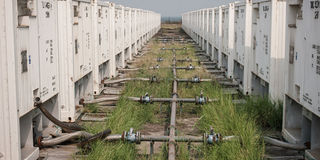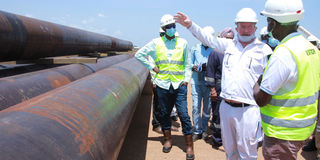Prime
Hope for Uganda’s oil as the G7 shift goal posts

Ramathan Ggoobi (2nd right), the permanent secretary in the Finance ministry, stands near oil drilling conductor pipes in the KingFisher oilfields during a tour of the oil facilities in the Albertine Graben in April 2022. Photo/ Paul Murungi
What you need to know:
- Uganda is among the countries that have in the last six months faced scathing attacks from climate activists over her oil projects. But with the Russia-Ukraine war, energy security is still needed.
Uganda will get a head start for her oil projects, only if the Group of Seven (G7) countries maintain their new position aimed at increasing oil production.
The G7 countries consisting of Canada, France, Germany, Italy, Japan, the United Kingdom and United States of America called on energy-exporting countries to increase oil production at a summit held in Germany in June.
The G7’s shift in favour of fossil fuels follows years of de-campaign as the energy transition question gathers steam towards green energy solutions.
Uganda is among the countries that have in the last six months faced scathing attacks from climate activists over her oil projects.
The climate pressure is geared towards the construction of the 1,443 kilometre heated East African Crude Oil Pipeline Project (EACOP) running from Hoima district in Uganda to the Port of Tanga in Tanzania.
A new report assessing the oil pipeline and associated oil fields against internationally recognised environmental and human rights standards for financial institutions found “numerous violations, putting banks at risk if they sign on to support the project.”
The assessment was undertaken by the Africa Institute for Energy Governance (AFIEGO) based in Uganda and Inclusive Development International (IDI).
It also includes BankTrack, an international tracking, campaigning and civil society support organisation targeting private sector commercial banks (‘banks’) and the activities they finance.
It suggests that the project is not in compliance with many of the criteria set forth in the Equator Principles and the Environmental and Social Performance Standards of the International Finance Corporation (IFC), two internationally recognised standards for responsible finance.
“The EACOP project developers have committed to adhere to the IFC Performance and other international standards. However, while implementing the EACOP and its associated upstream oil projects, the developers have come short in complying with the standards,” says Diana Nabiruma, AFIEGO’s senior communications officer as quoted in a press statement.
But even with such rallying cries from climate activists, the tide is shifting, the world still demands that more oil and gas is required for industries to run.

Mohammad Sanusi Barkindo, the outgoing Secretary General at Organisation of the Petroleum Exporting Countries (OPEC) notes that it is unfortunate that the policy narrative in the run-up to and during at the UN Climate Change Conference (COP26) held last year in Glasgow, UK was heavily distorted against fossil fuels and divorced from the reality of the world’s energy needs.
Barkindo made the remarks contained in a statement published on the OPEC website while at the opening ceremony of the 21st edition of Nigeria Oil and Gas (NOG) Conference and Exhibition in early July.
He observed that developing countries were urged to turn their backs on their own hydrocarbon (fossil fuel) assets, even though their right to sovereignty over the use of these natural resources is carved in the Paris Agreement’s principle of equity in the context of sustainable development.
Barkindo noted that the pronouncements were misleading and yet, key stakeholders in the industry are currently participating in the intergovernmental arrangements and initiatives to develop, deploy and promote cutting-edge technologies to reduce emissions from the production.
The shift towards the need for fossil fuels to address the world’s energy needs saw Barkindo hail the new decision that was reached at the G7 leaders’ Summit in Germany.
“They [G7 group] took a step in the right direction by recognising the need for continued investment in fossil fuels to help meet the world’s energy needs,” he stated.
“Both the market and consumers deserve clear and consistent policies which recognise that oil is indispensable to global economic development and the world’s energy mix,” Sanusi said, noting that, “Our industry cannot afford to sleepwalk into another crisis.”

Ramathan Ggoobi (2nd right), the permanent secretary in the Finance ministry stands next oil drilling conductor pipes in the KingFisher oilfield area during a tour of the oil facilities in the Albertine Graben in April 2022.
One can call it a ‘perfect storm’ and another a ‘siege’ but for starters, Barkindo makes sense of the evolving geopolitical developments in Eastern Europe, the ongoing war in Ukraine, the ongoing Covid-19 pandemic and inflationary pressure.
All this happening across the globe have come together to cause significant volatility and uncertainty in the world of oil.
Even before the G7 summit, Kwasi Kwarteng, UK’s Secretary of State for Business and Energy, published a statement on April 30th announcing a launch of another licensing round to explore new oil blocks in the UK’s North Sea oil fields.
The North Sea, according to Mr Kwasi, had provided a stable domestic supply of oil and gas to the UK for the last 50 years, and remains a great national asset to insulate the UK from developing a dependency on Russian hydrocarbons.
He made it clear that the UK, “would not bend to the will of (climate) activists who naively want to extinguish (oil) production in the UK Continental Shelf – noting that, “doing so would put energy security and British jobs at risk.”
Looking further down the road, OPEC’s most recent World Oil Outlook report gives some perspective on what is yet to come.
Investments
OPEC shows the global oil sector will still need cumulative investments of $11.8 trillion in the upstream, midstream and downstream through to 2045 to meet expectations for significant growth in energy demand.
With regard to demand, there is only one direction, and that is up. In fact, OPEC projects that total primary energy demand will expand by a robust 28 percent in the period to 2045.
Oil is expected to retain the largest share of the energy mix, accounting for just over a 28 percent share in 2045, followed by gas at around 24 percent.
In other words, oil and gas together will continue to supply more than half of the world’s energy needs for many decades.
These hydrocarbons are especially vital to the energy mix in regions such as Africa, which will see massive population shifts and economic growth in the coming years. These developments increase the urgency of eradicating energy poverty.
Ali Sekatawa, director of legal and corporate affairs, at Petroleum Authority of Uganda, notes that the decision of COP26 required an energy transition up to 2050 with a reduction in greenhouse gas emissions.
However, the decision also acknowledged the world still needs petroleum to transition.
Sekatawa notes that the position of the G7, in his view exposes “their shallowness” after being hit with the reality with the Ukraine war that energy security is still needed ahead of the transition.
He observes that the G7 countries’ return to oil is being selfish, and it is “until they got energy scarcity when they decided to do a turnaround and yet Africa is still energy poor at 60 percent.”
“We were confident that whatever discussion is being made about the transition, it doesn’t affect the 1.4 billion barrels of oil that we can extract,” he notes.
On financing, Sekatawa says they remain confident with the genuine financiers who have been in conversation with the government.
Financing
It has been a matter of policy for some financial institutions in G7 countries to retract on financing obligations for the oil industry over climatic concerns.
It is early to predict as financing for oil and gas has been on a downward spiral. But a top government official in Uganda’s energy sector says there is more hope for financing to be unlocked from G7 countries as they return into fossil fuel production.
Most of the financing entities that are unable to participate in any fossil fuel project not specifically for the Ugandan one were driven by policy in their countries.
If those policies change, “we shall see more financing for oil projects,” the government official says. But he insists the financing entities must focus on whole industries that emit carbon, not simply oil and gas.
“We want to manage climate impact and have energy security for developed and developing countries to develop. So there has to be a meeting of minds between the different needs, whereas if G7 because of its strength says we are not doing this, financing entities from those countries will follow suit,” he notes.
He observes that there is development of minds towards oil between all the entities that make the world.
“We need to reach a level where we know developing countries are dealing with energy poverty. We need to structure the energy transition case with an allowance for the countries to develop, and deal with energy poverty,” he says.




